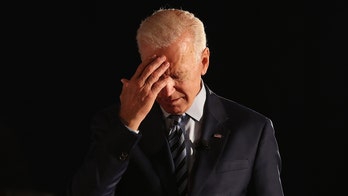Trump takes presidential tone in marking Super Tuesday wins
Fox News media analyst Howard Kurtz breaks down what it all means on 'America's Newsroom'
As the right, the left and the media finally emerge from a state of denial, the spotlight is shifting to a Trump-Clinton contest.
And that may turn on whether the likely GOP nominee can attract enough Donald Democrats.
There is no shortage of conservatives who think Trump—if he can in fact shake off Ted Cruz and Marco Rubio and get to 1,237--is such a flawed nominee that Hillary will beat him like a drum. And there are liberals who are delighted at the prospect of running against such a controversial figure.
Trump’s two biggest obstacles, in my view, are the Democrats’ built-in Electoral College advantage, and his high negatives among minority voters.
But he has a visceral appeal to working-class voters and independents who are struggling financially, angry with a system that has given them little, and perhaps resentful of illegal immigrants and drawn to Trump’s aura of strength. Thus, like the once-mocked Ronald Reagan, he could attract defectors that I hereby christen Donald Democrats.
For all those who say that’s impossible, that Trump can’t put enough of them in play in states like Michigan, Ohio, Pennsylvania and New York, I’d remind you that most of the geniuses in the media and political establishments said he had no shot at the nomination.
As former Clinton White House adviser Doug Sosnik told Politico: “It’s fair to say there’s been a graveyard already out there of people underestimating him. And I am old enough to remember the sort of Democratic intelligentsia that was hoping Ronald Reagan would be nominated by Republicans in 1980 because everyone knew he was a doddering old right winger who could never get elected president.”
Trump’s general-election pivot began with his rather restrained Super Tuesday presser. But before he can get there, he has to deal with the eleventh-hour opposition from the remnants of the Republican establishment he is on the verge of vanquishing.
I love listening to the hand-wringers say that if only that establishment had moved against Trump sooner, he wouldn’t be on the verge of seizing the nomination after having won 10 out of 15 contests.
I mean, seriously: What could the party big shots have done? Poured more money into Super PACs? Denounced him more publicly? Try harder to muscle other candidates out of the race? Nothing has worked against Trump. In fact, that kind of opposition probably helps him.
Republicans such as Sen. Ben Sasse have already announced that they could never vote for Trump, and Christie Todd Whitman says she would vote for Clinton instead. But how many are likely to follow their lead? What about all the conservative commentators who have described Trump as a menace to the party and the country?
The New York Times describes “a loud and persistent refusal to rally around him” with lifelong Republicans declaring “they would boycott the election…
“The revulsion for Mr. Trump could produce a nightmare scenario for Republicans on Election Day: abandonment by rank-and-file voters who, like a growing number of party leaders, cannot stomach the concept of the mogul as their standard-bearer.”
The Washington Post offers a similar verdict:
“The window for stopping Donald Trump closed almost completely Tuesday night, leaving the demoralized anti-Trump forces with two weeks and no agreed-upon strategy for denying the New York billionaire the Republican presidential nomination….
“For the GOP establishment, Super Tuesday had nightmarish qualities. Not only did Trump tighten his grip on the nomination, but the only candidate who has been able to beat him more than once so far is Cruz, the nemesis of Republican congressional leaders…In a choice between Trump and Cruz, many who could be counted as part of that establishment would be hard-pressed to declare a preference.
“What is remarkable is that the anti-Trump forces only recently awoke to the reality that Trump was on track to take the nomination.”
So both papers use the word nightmare—except you can wake up from a nightmare.
Politico says Trump’s seven-state win on Tuesday “pushed the party he seeks to lead to the breaking point,” and is “vivid proof that the Republican Party as we’ve known it for decades, a party controlled by an enclave of country clubbers and an East Coast establishment, is no more.
“With every victory, Trump is splintering the party, evoking strong emotions from an increasingly outspoken group of detractors and from the rank-and-file voters propelling his candidacy and rendering the GOP’s Washington power brokers powerless.”
Every nominee imposes his will on the party, but in this case the choice is between capitulation and chaos. The best-case scenario for the anti-Trump forces is that he goes to Cleveland somewhat short of the required number of delegates and has to face a contested convention.
But if the party honchos somehow manage to wrest the nomination from their front-runner, wouldn’t that alienate legions of Trump supporters and virtually hand the election to Hillary Clinton?





